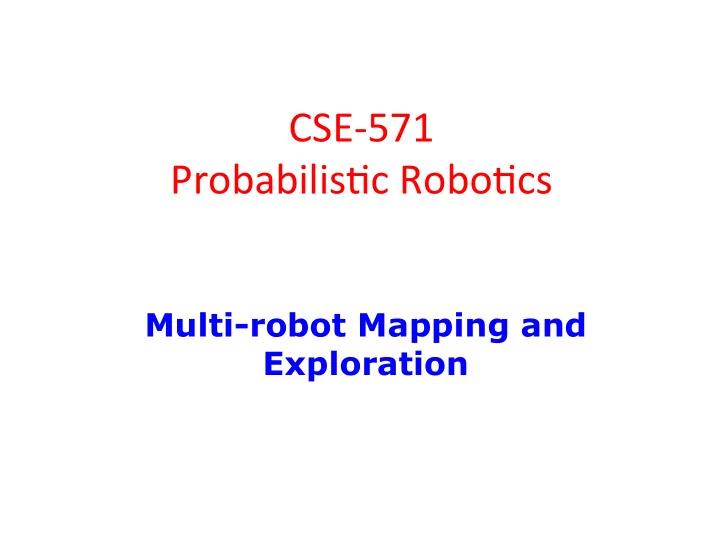

CSE-‑571 ¡ Probabilis1c ¡Robo1cs ¡ Multi-robot Mapping and Exploration SA-1
Sponsored by DARPA-SDR, NSF, Intel ► Map an unknown area ► Search for an “ object of value ” ► Set up a surveillance network ► Track any intruders SA-1
Mapping ¡the ¡Allen ¡Center ¡ CSE 571: Probabilistic Robotics 3
Coordinated ¡Explora1on ¡ ∑ ∑ C ( θ ) = U ( θ ) = dist( i , j ) explore( i , j ) ( i , j ) ∈ θ ( i , j ) ∈ θ ( ) ∗ θ = θ − θ arg max U ( ) C ( ) [Burgard et al. 00], [Simmons et al. 00] θ CSE 571: Probabilistic Robotics 4
Mul1-‑Robot ¡Mapping ¡With ¡Known ¡Start ¡ Loca1ons ¡ CSE 571: Probabilistic Robotics 5
Mul1-‑Robot ¡Mapping ¡With ¡Known ¡Start ¡Loca1ons ¡ CSE 571: Probabilistic Robotics 6
Why ¡are ¡Unknown ¡Start ¡Loca1ons ¡Hard? ¡ Robot A Robot B Robot C ► Need ¡to ¡know ¡whether ¡or ¡not ¡maps ¡overlap ¡ ► Need ¡to ¡know ¡how ¡maps ¡overlap ¡ CSE 571: Probabilistic Robotics 7
Mul1-‑robot ¡Map ¡Merging ¡ • Problems ¡ – Number ¡of ¡possible ¡merges ¡is ¡exponen1al ¡in ¡ number ¡of ¡robots ¡ – Cannot ¡merge ¡maps ¡by ¡simply ¡overlaying ¡them ¡ • Wanted ¡ – Scalability, ¡robustness ¡ – Merge ¡maps ¡as ¡soon ¡as ¡possible ¡ CSE 571: Probabilistic Robotics 8
Mul1-‑robot ¡Map ¡Merging ¡ CSE 571: Probabilistic Robotics 9
Mul1-‑robot ¡Map ¡Merging ¡ CSE 571: Probabilistic Robotics 10
Mul1-‑robot ¡Map ¡Merging ¡ CSE 571: Probabilistic Robotics 11
Es1ma1ng ¡rela1ve ¡loca1ons ¡ • Idea: ¡Localize ¡one ¡robot ¡in ¡other ¡robot ’ s ¡map ¡ using ¡par1cle ¡filter ¡ • Problems: ¡ ¡ – Only ¡par1al ¡map ¡available ¡ – Other ¡robot ¡might ¡be ¡outside ¡the ¡map ¡ – Map ¡grows ¡ – Impossible ¡to ¡keep ¡track ¡of ¡all ¡loca1ons ¡inside ¡and ¡ outside ¡the ¡par1al ¡map ¡ • Solu1on: ¡Only ¡keep ¡track ¡of ¡trajectories ¡that ¡ ¡ overlapped ¡map ¡at ¡some ¡1me ¡ CSE 571: Probabilistic 12 Robotics
Par1al ¡map ¡localiza1on ¡(intui1on) ¡ Overlapping ¡trajectories ¡ • = p ( x | z , u ) − t 1 : t 1 : t 1 [ ] ∫ α ⋅ + p ( z | x ) p ( x | x , u ) p ( x | z , u ) dx p ( x | n , u ) p ( n | z , u ) − − − − − − − − − − − t t t t t 1 t 1 t 1 1 : t 1 1 : t 2 t 1 t t 1 t 1 t 1 1 : t 1 1 : t 2 Non-‑overlapping ¡trajectories ¡ • = α − ε p ( n | z , u ) p ( z | outside )( 1 ) p ( n | z , u ) − − − − t 1 : t 1 : t 1 t t t 1 1 : t 1 1 : t 2 CSE 571: Probabilistic 13 Robotics
Par1al ¡map ¡localiza1on ¡(example) ¡ CSE 571: Probabilistic 14 Robotics
Coordina1on ¡ ∑ ∑ ⎧ dist( i , j ) if j is frontier ⎧ explore( i , j ) if j is frontier θ = θ = C ( ) dist( i , j ) U ( ) explore( i , j ) ∑ ∑ θ = θ = C ( ) U ( ) ⎨ ⎨ + dist( i , j ) meet( i , j ) if j is hypothesis p ( j ) merge( i , j ) if j is hypothesis ⎩ ∈ θ ∈ θ ⎩ ( i , j ) ( i , j ) ∈ θ ∈ θ ( i , j ) ( i , j ) ( ) ∗ θ = θ − θ arg max U ( ) C ( ) Hypotheses become potential goals [Burgard et al. 00], θ [Simmons et al. 00], CSE 571: Probabilistic [Zlot et al. 02] 15 Robotics
Experimental ¡setup ¡ CSE 571: Probabilistic 16 Robotics
CSE 571: Probabilistic Robotics 17
Cen1Bots: ¡Experimental ¡Evalua1on ¡ • Rigorously ¡tested ¡by ¡outside ¡evalua1on ¡team ¡ • No ¡tes1ng ¡allowed ¡in ¡1/2 ¡of ¡environment ¡ • Limited ¡communica1on ¡ • No ¡interven1on ¡/ ¡observa1on ¡during ¡experiment ¡ • Comparison ¡to ¡ “ ground ¡truth ” map ¡ CSE 571: Probabilistic Robotics 18
Control ¡Center ¡and ¡ Test ¡Team ¡ CSE 571: Probabilistic Robotics 19
CSE 571: Probabilistic Robotics 20
Comparison ¡to ¡ “ Ground ¡Truth ¡Map ” ¡ CSE 571: Probabilistic Robotics 21
Three ¡Mapping ¡Runs ¡ CSE 571: Probabilistic Robotics 22
Three ¡Overlayed ¡Maps ¡ CSE 571: Probabilistic Robotics 23
Recommend
More recommend